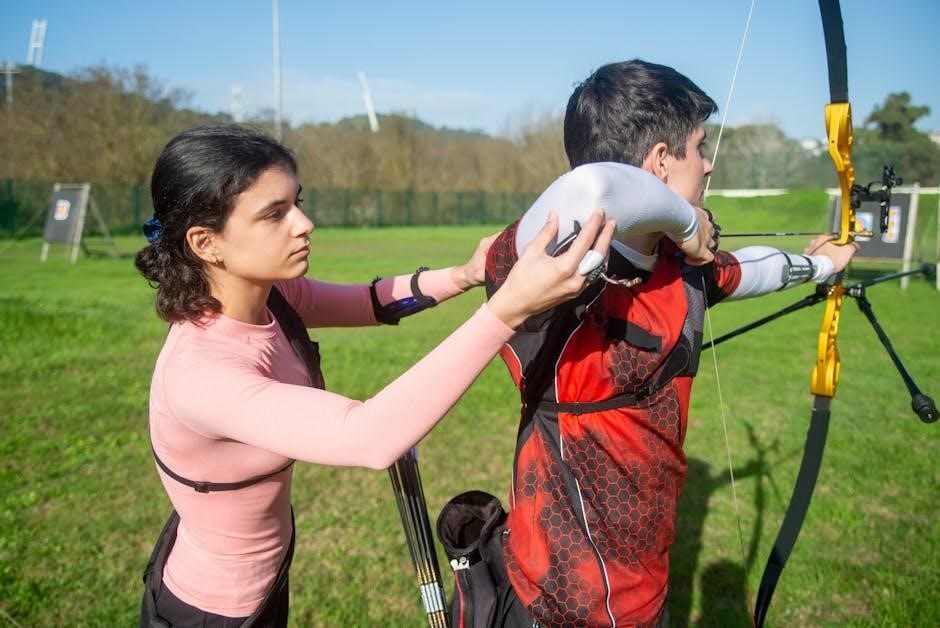Instructional coaching models provide personalized support to educators, focusing on improving teaching practices and student outcomes through collaborative, data-driven approaches․ Coaches empower teachers to refine their instructional strategies․
1․1 Definition and Purpose of Instructional Coaching
Instructional coaching is a collaborative, personalized approach where coaches work with teachers to enhance instructional practices․ Its primary purpose is to improve teaching effectiveness, student outcomes, and teacher confidence․ Coaches provide tailored support, data-driven feedback, and professional development opportunities, fostering a growth mindset and helping educators refine their skills to meet diverse learner needs effectively․
1․2 Evolution of Instructional Coaching in Education
Instructional coaching has evolved from informal mentoring to structured, research-based practices․ Initially focused on teacher support, it now emphasizes data-driven strategies, personalized learning, and student-centered approaches․ The integration of technology and innovative coaching models has transformed the field, making it a cornerstone of professional development in education, fostering continuous improvement in teaching and learning environments․
Key Instructional Coaching Models
Instructional coaching models include Peer Coaching, Cognitive Coaching, and Instructional Consulting․ These frameworks provide structured approaches to support teachers in enhancing instructional practices and student outcomes effectively․
2․1 The Peer Coaching Model
The Peer Coaching Model involves teachers working collaboratively in pairs to observe, reflect, and improve instructional practices․ This teacher-led, reciprocal approach fosters professional growth through shared experiences and feedback, promoting a culture of collaboration and continuous improvement․ It encourages educators to take ownership of their development while supporting one another, enhancing teaching strategies and student outcomes effectively․
2․2 The Cognitive Coaching Model
The Cognitive Coaching Model emphasizes enhancing teachers’ self-awareness and decision-making skills․ Coaches use reflective strategies to help educators identify their own strengths and areas for improvement․ This model focuses on mental processes, encouraging teachers to think critically about their practices․ By fostering a growth mindset, it empowers educators to independently solve challenges and refine their instructional methods for better student outcomes․
2․3 The Instructional Consulting Model
The Instructional Consulting Model involves coaches acting as expert advisors, providing targeted guidance to teachers․ This model focuses on improving specific classroom practices through collaborative planning and data-driven feedback; Coaches offer tailored strategies and resources, helping educators address challenges and enhance student learning outcomes․ It emphasizes a consultative approach, fostering teacher autonomy and evidence-based instructional practices․

Strategies for Effective Instructional Coaching
Effective instructional coaching involves collaboration, active listening, and providing actionable feedback․ Coaches help teachers set clear goals, reflect on practices, and implement evidence-based strategies to enhance student learning․
3․1 Building Teacher-Coach Relationships
Building strong teacher-coach relationships is foundational to effective instructional coaching․ Trust, active listening, and empathy foster collaboration․ Coaches empower teachers by understanding their challenges and celebrating successes, creating a safe space for growth․ Open communication and mutual respect enable teachers to feel supported, leading to meaningful professional development and improved classroom practices․
3․2 Setting SMART Goals for Professional Development
Setting SMART (Specific, Measurable, Achievable, Relevant, Time-bound) goals is critical in instructional coaching․ Coaches help teachers define clear objectives, aligning with school priorities and teacher needs․ These goals guide focused professional development, ensuring progress is trackable and meaningful, leading to enhanced teaching practices and improved student outcomes through structured, intentional growth plans․
3․3 Using Data-Driven Feedback in Coaching
Data-driven feedback is essential in instructional coaching, enabling teachers to refine their practices based on measurable outcomes․ Coaches use classroom observations, student performance data, and video recordings to identify strengths and areas for improvement․ This approach ensures feedback is actionable, fostering teacher growth and enhancing student learning through targeted, evidence-based strategies and collaborative goal-setting․

Supporting Teachers Through Coaching
Coaching provides tailored support to teachers, addressing challenges like burnout and fostering professional growth through personalized strategies and collaborative goal-setting to enhance instructional effectiveness and well-being․
4․1 Addressing Teacher Burnout and Stress
Instructional coaches play a vital role in supporting teachers experiencing burnout by fostering resilience and well-being․ Through active listening, stress management techniques, and collaborative goal-setting, coaches help educators regain balance and enthusiasm, ensuring a supportive environment where teachers can thrive personally and professionally, aligning these efforts with personalized learning plans to enhance overall well-being and teaching effectiveness․
4․2 Personalized Learning Plans for Teachers
Personalized learning plans for teachers, created in collaboration with instructional coaches, tailor professional development to individual needs․ Coaches help teachers set SMART goals, identify resources, and track progress․ These plans foster autonomy, ensuring teachers receive targeted support to enhance their instructional practices and address specific challenges, ultimately improving student outcomes and teacher confidence in the classroom․
4․3 Fostering a Growth Mindset in Educators
Fostering a growth mindset among educators is crucial for instructional coaching․ By emphasizing that abilities can be developed through effort, coaches encourage teachers to embrace challenges and view failures as learning opportunities․ This mindset shift promotes resilience, openness to feedback, and continuous improvement, leading to enhanced teaching practices and a more dynamic educational environment for both teachers and students alike․
The Role of Technology in Instructional Coaching
Technology enhances instructional coaching by providing tools for video observations, digital feedback, and collaborative platforms, enabling coaches to support teachers more effectively and efficiently․
5․1 Leveraging Video Coaching Tools
Video coaching tools enable coaches to record, analyze, and provide feedback on teaching practices․ This technology facilitates personalized professional development, allowing teachers to reflect on their methods and improve instruction․ Coaches can share specific clips with teachers, fostering targeted growth and enhancing student outcomes through data-driven insights and collaborative reflection․
5․2 Digital Platforms for Coaching Feedback and Collaboration
Digital platforms enhance instructional coaching by streamlining feedback and fostering collaboration․ These tools allow coaches to share resources, track teacher progress, and facilitate real-time communication․ They provide a centralized space for coaches and teachers to collaborate, ensuring alignment with goals and promoting continuous growth․ Such platforms support innovative teaching practices and professional development․

Measuring the Impact of Instructional Coaching
Evaluating instructional coaching involves assessing teacher growth, student outcomes, and program effectiveness to ensure continuous improvement and alignment with educational goals․
6․1 Assessing Teacher Growth and Student Outcomes
Evaluating teacher growth involves observing instructional improvements and tracking professional development progress․ Student outcomes are measured through academic performance and achievement data․ Coaches use assessments, feedback, and data analysis to align coaching strategies with teacher needs and classroom goals, ensuring a direct impact on both educator effectiveness and student success․
6․2 Evaluating Coaching Program Effectiveness
Evaluating coaching program effectiveness involves assessing alignment with school goals, teacher satisfaction, and overall impact․ Metrics include teacher feedback, program participation rates, and observable improvements in teaching practices․ Surveys, observations, and data analysis help determine if coaching initiatives are meeting objectives, fostering professional growth, and contributing to a positive educational environment․

Professional Development for Instructional Coaches
Professional development for instructional coaches includes training programs, continuous learning opportunities, and mentorship, ensuring coaches remain effective in supporting teachers and driving educational growth․
7․1 Training Programs for New Coaches
Training programs for new instructional coaches are designed to build foundational knowledge and practical skills․ These programs often include workshops, mentorship, and hands-on experience, focusing on techniques like active listening, data analysis, and goal-setting․ Coaches learn to support teachers effectively, fostering collaboration and instructional improvement․ Experienced educators and experts like Jim Knight and Marzano often contribute to these structured initiatives․
7․2 Continuous Learning Opportunities for Veteran Coaches
Veteran coaches benefit from advanced workshops and professional development focused on emerging trends and innovative strategies․ Continuous learning ensures they stay updated on best practices, integrating technology like AI and machine learning into their coaching․ Mentorship programs and collaborative networks also help veteran coaches refine their skills, fostering ongoing growth and adaptability in their roles․

Implementing Instructional Coaching at Scale
Implementing instructional coaching at scale involves school-wide initiatives and district-level support, ensuring alignment with educational goals and fostering a culture of continuous improvement and collaboration among educators․
8․1 School-Wide Coaching Initiatives
School-wide coaching initiatives involve structured programs where instructional coaches collaborate with teachers to enhance teaching practices․ These initiatives align with school goals, fostering a culture of continuous improvement․ Coaches provide personalized support, data-driven feedback, and facilitate professional learning communities (PLCs)․ By integrating coaching into daily operations, schools create sustainable systems to elevate teacher effectiveness and student achievement across all grade levels and subjects․
8․2 District-Level Support for Coaching Programs
District-level support is crucial for scaling instructional coaching programs․ Districts provide resources, training, and infrastructure to ensure coaching initiatives align with broader educational goals․ By establishing clear protocols and offering ongoing professional development, districts empower coaches to effectively support teachers․ This centralized approach fosters consistency, maximizes program impact, and ensures equitable access to coaching opportunities across all schools within the district․

Overcoming Challenges in Instructional Coaching
Instructional coaching faces challenges like teacher resistance, limited resources, and burnout․ Coaches must foster trust, provide emotional support, and use data-driven strategies to address these barriers effectively․
9․1 Common Barriers to Effective Coaching
Common barriers include teacher resistance to change, limited time for coaching, and lack of resources․ Additionally, coaches may struggle with maintaining confidentiality, managing diverse teacher needs, and measuring impact․ Addressing these challenges requires strong communication, flexibility, and a supportive school culture to ensure coaching effectiveness and sustainability over time for all educators involved․
9․2 Strategies for Sustaining Coaching Programs
Sustaining coaching programs requires ongoing training for coaches, regular feedback loops, and strong administrative support․ Building a coaching culture, leveraging technology for scalability, and ensuring alignment with school goals are key․ Continuous monitoring and adaptation of programs, along with celebrating successes, help maintain momentum and ensure long-term impact on teacher development and student achievement․
The Role of School Leaders in Coaching
School leaders play a pivotal role in fostering a coaching-friendly environment, supporting teacher development, and aligning coaching initiatives with school goals to enhance student success․
10․1 Principals as Coaches and Mentors
Principals, acting as coaches and mentors, foster teacher growth by offering targeted support and feedback․ They model effective instructional practices, encourage reflection, and create a culture of continuous improvement, ensuring alignment with school goals and promoting professional development among educators․
10․2 Creating a Coaching-Friendly School Culture
A coaching-friendly school culture emphasizes collaboration, trust, and open communication․ Principals play a key role in fostering this environment by promoting professional development, encouraging teacher-coach partnerships, and valuing continuous improvement․ Such a culture supports teacher growth and enhances student outcomes, ensuring sustainable success across the institution․
Future Trends in Instructional Coaching
Future trends in instructional coaching include integrating AI and machine learning for personalized teacher support and expanding coaching to address student well-being initiatives effectively․
11․1 Integrating AI and Machine Learning in Coaching
AI and machine learning are transforming instructional coaching by enabling personalized feedback, real-time data analysis, and adaptive learning strategies․ These technologies help coaches identify teacher needs, tailor interventions, and track progress more efficiently, fostering scalability and innovation in educational support systems while enhancing teacher and student outcomes․
11․2 Expanding Coaching to Support Student Well-being
Expanding instructional coaching to address student well-being integrates social-emotional learning and mental health support․ Coaches now help teachers create nurturing environments, fostering resilience and emotional intelligence․ This holistic approach ensures students’ overall development, aligning academic success with personal growth and well-being, preparing them for lifelong challenges and opportunities․
Instructional coaching models empower educators to enhance teaching practices, fostering student success and school improvement․ By focusing on collaboration and data-driven strategies, coaching shapes the future of education․
12․1 Summarizing the Importance of Instructional Coaching Models
Instructional coaching models are vital for empowering educators to refine teaching practices, enhance student outcomes, and foster a culture of continuous improvement․ By providing personalized support, data-driven feedback, and collaborative opportunities, these models ensure educators grow professionally, leading to more effective and engaging learning experiences for students, ultimately strengthening the entire educational system․
